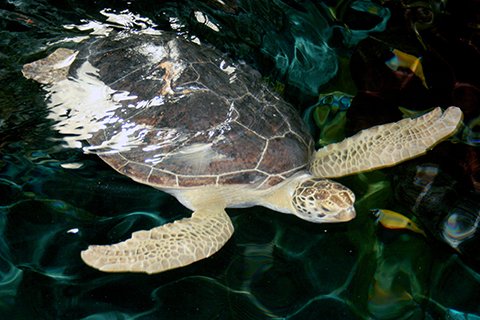U of M engineering students to create prosthetic for injured sea turtle

CT scan marks first step in helping Seemore a sea turtle from SEA LIFE at the Mall of America
MINNEAPOLIS (06/16/2017) — Seemore the Green Sea Turtle from SEA LIFE Aquarium at Mall of America was at the University of Minnesota Veterinary Hospital for a CT Scan on Friday, June 16 (World Sea Turtle Day).
This is the first step in the process of creating a prosthetic shell for Seemore—a permanent solution for her condition known as “Bubble Butt Syndrome.”
Seemore was hit by a boat off the coast of Florida in 2009, which damaged her shell. That damage left her unable to swim and dive properly as gas gets trapped in the shell and makes her bottom float on top of the water.
To help Seemore swim, SEA LIFE currently attaches weights to her shell’s scutes (the outer layers of the shell). The weights improve her buoyancy and allow her to swim more easily, but they fall off when her scutes shed. The animal care team is forced to take her out of her exhibit to replace them, causing undue stress on Seemore. This is not a sustainable solution.
The CT Scan will provide shell dimensions that engineering students from the University of Minnesota Medical Devices Center will use to create a 3D model for Seemore’s new prosthetic shell. The prosthetic shell will give the Aquarium a better attachment surface for the weights which can stay on permanently rather than being attached directly to the shell.
Seemore is from the SEA LIFE Aquarium at Mall of America. She is a Green Sea Turtle; the second largest species of sea turtle, and currently weighs about 100 pounds. SEA LIFE provides permanent homes for damaged and disabled creatures like Seemore that have been rescued and need a home. SEA LIFE Aquarium got her in 2011 from the Sea Turtle Hospital in Marathon Key Florida after they deemed her un-releasable.
